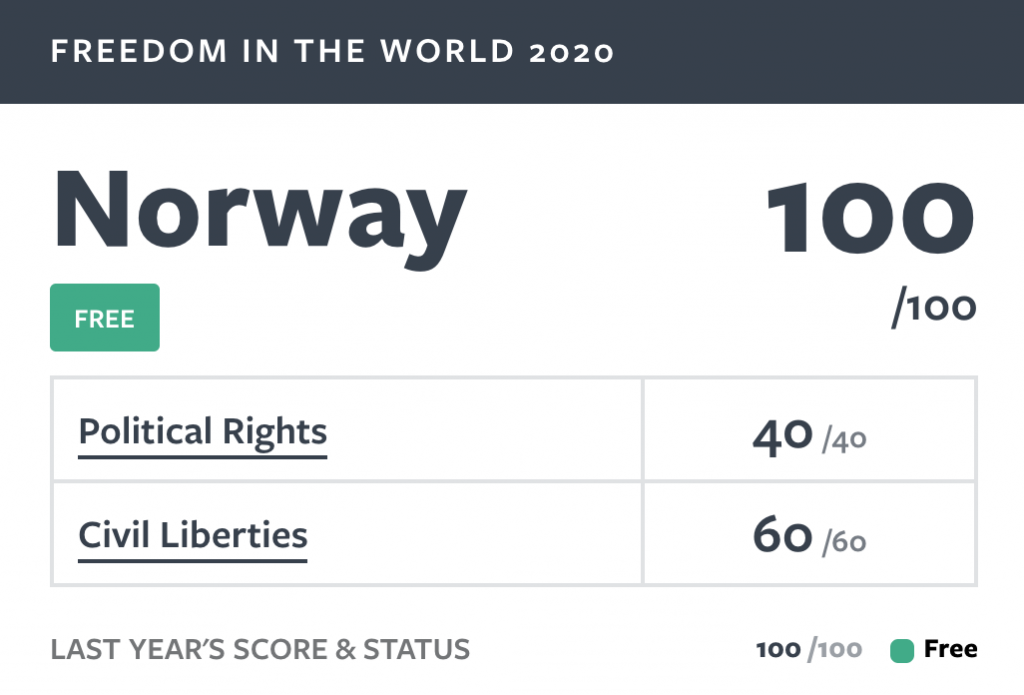Democracy Standing Strong Through the Pandemic
Norway, a country known for their stable and successful democracy, was able to feel confidence in their government’s ability to weather the COVID-19 pandemic because of the solid political institutions that have been in place since they became a consolidated democracy.
In a world crisis such as the coronavirus pandemic, countries who are democratic that don’t have strong institutions, are more likely to experience instability and conflict within their governments. This is due to the fact that institutions are the main linkage between citizens and the state, which is a relationship that is vital for a strong democracy. The Norwegian government has been able to protect the civil liberties and rights of its citizens, while also protecting their health during the pandemic. With government activities having to be drastically changed to protect the health and safety of everyone, Norway was able to quickly and confidently work to protect the country as a whole.
Norway Before COVID-19
How did the political institutions of Norway promote the strength of a stable democracy during a pandemic? In order to understand how Norway was able to successfully remain a strong democracy during COVID-19, we first need to understand the history of the Norweigan democracy. Norway transitioned from an autocracy to a democracy on May 17, 1814, when their Eidsvall Assembly signed the Norweigan Constitution. This was the first time political institutions were set in stone in a democratic light. Once Norway became a democracy they were able to grow and flourish from there. And eventually, they became one of the highest rated democracies in the world (Freedom House Index). Because of their extremely liberal and longstanding constitution, Norway was able to become an example for other countries transitioning to democracy. The Norwegian government today can be described as a multiparty parliamentary democracy and one that has proved to have the trust and confidence of their citizens. The government was ranked the seventh least corrupt country in the world by ‘Transparency International,’ after their 2020 evaluation of social and political governance in Norway. The political institutions of Norway have been in place and have grown stronger over time preparing them to guide the country through the pandemic.

Source: Freedom House Index
Why Do Political Institutions Make a Democracy Strong?
No two democratic systems of government have the same political institutions or ways of governing. That is due to the fact that depending on the history, public opinion, and conflicts occuring in a certain country, one form of democracy could cause chaos while another could cause stability. For instance, in the chapter “What Drives Democracy?” in Driving Democracy, Harvard professor Pippa Norris writes that “…formal institutions in civil society also play a vital role in sustaining democratic governance by linking citizens and the state…”. Through the use of institutions, a democracy is able to protect and also live up to the expectations of their citizens. The political institutions that a democracy has are there in order to hold those who are given a position of power accountable for their actions. Although any system of government has institutions, those in democratic systems are in place in order to maintain the rule of law (Rose 2019, 44). In order to ensure that these political institutions are maintaining the rule of law, a constitution is formed in order to keep the political institutions in check. Further explained by Richard Rose in the chapter “Democratic and Undemocratic States,” in the textbook Democratization, “The constitutions of democratic states set out fundamental rules for the practice of democratic governance…” (Rose 2019, 44). Political institutions are able to make a democratic state stable and strong by maintaining the rule of law.
The Political Institutions Active In Norway During the Pandemic
Norway is known for being free, fair, and stable. They have accomplished years of high ranking democratic scores in democracy indices around the world, and an ability to keep their citizens happy while still keeping their country safe. As explained in the U.N. executive summary of Norway, the government consists of a prime minister, a cabinet, and a 169-seat legislature that is elected every four years (The United Nations Executive Summary). Through these institutions, along with their judicial system which, from looking at the Freedom House Index we see is fair and unbiased, it is clear that the institutions in place in Norway are able to maintain the rule of law. Furthermore, in the Polity IV Country Report of Norway from 2010, it is shown that the government is accountable before the legislature, and the judiciary branch is independent. As previously stated, the political institutions only make a democracy strong and stable when they are able to maintain the rule of law. This is why Norway has been able to create a democracy that has not been shaken or broken down over the many years. And when a pandemic hit, while other countries trembled, Norway was able to stand solid against the chaos of the world because of their political institutions.
Norway’s Response to the Pandemic
When the pandemic was hitting countries around the world, there was a fear that came over every government worldwide. During this time, governments had to implement new plans and policies that they never thought were ever going to be needed. The prime minister of Norway is Edna Solberg, and when the coronavirus hit Norway, she took quick action. Through her ability to communicate carefully and thoughtfully with her constituents once there was a dramatic increase in COVID-19 infections, she was able to increase the confidence of the citizens of Norway while still protecting them (White 2020, 7). With the Norwegian government’s ability to keep their citizens calm and also safe, they were able to actually strengthen their democracy. The political institutions of Norway during this time were strengthened due to the emergency state that the country entered. From there, the political institutions gained more trust and confidence from their constituents and further strengthened their position as a democratic regime. Not only was the prime minister able to communicate well with her constituents, but also the other forms of leadership exhibited an aggressive approach which allowed for the country to handle the pandemic (White 2020, 7). The political institutions of Norway were able to respond to the pandemic in a way that allowed for the constituents to feel confident in their government and for the country as a whole to remain stable. It was the reliability of the political institutions that allowed Norway to not only keep the citizen’s of the country safe during a pandemic but furthermore, allowed Norway to become more stable.
Institutional Trust in Norway
Although the importance of institutions in Democracy is very apparent, it is important to include the institutional trust that has been present among Norweigian citizens prior to, and during the pandemic. The citizens of Norway have been able to establish a strong trust within the political institutions present, and this is due to many different factors. A survey was conducted through the Journal of Trust Research in order to determine the level of trust that citizens of Norway had in their government institutions in 2016. This research that was conducted concluded that the trust that Norwegian citizens have in the government institutions branches from a long history of social and political-institutional trust. Because the government of Norway has been able to follow the rule of law and protect the civil rights and liberties of its citizens since their constitution was created, the people of Norway were able to have established trust in institutions prior to the pandemic. This thus allowed the Norwegian government to pass policies, and protect its citizens throughout the pandemic with ease and confidence. Although the institutions in Norway were able to keep the democracy stable and strong, it was the long history of institutional trust among the Norwegian citizens which further allowed the democracy in Norway to flourish.
Conclusion
When looking at what has kept democracies strong during the pandemic, we cannot ignore the important role of political institutions. When political institutions are strong and trustworthy, and are able to hold up the rule of law within a country, the democratic system that is in place will be able to be stronger, and less likely to backslide. In Norway especially, it is clear that one of the main factors that allowed for the government and country to remain safe was because of the political institutions. Countries during the pandemic experienced conflict and tension within their government and with their political institutions, but Norway was able to remain strong and stable throughout the entirety of the pandemic and still to this day is. They are beginning to be seen as one of the best democracies in the world, and are seen as examples of what a good democracy should look like. This is due to the strength and ability that the political institutions within Norway exhibit. Norway was able to grow stronger as a democracy during the pandemic because of the political institutions that were able to handle the pandemic in a way that made the constituents of Norway feel safe, and protected the country at the same time. Without the political institutions that are present within Norway, the government would not have been able to survive as a democracy throughout the coronavirus pandemic.
Ashley Gilmore is a Political Science and English Literature double-major, expected to graduate in December 2021.
References
White, Vernon, et al. “The Coronavirus Pandemic Is a Global Test of Leadership.” The Strategist, 22 Mar. 2020, www.aspistrategist.org.au/the-coronavirus-pandemic-is-a-global-test-of-leadership/.
Jacobsen, DI., et al. “The COVID-19 Pandemic in Norway and Sweden – Threats, Trust, and Impact on Daily Life: a Comparative Survey.” BMC Public Health, BioMed Central, 1 Jan. 1970, bmcpublichealth.biomedcentral.com/articles/10.1186/s12889-020-09615-3.
“The Political Framework of Norway.” The Political Framework of Norway – Economic and Political Overview – Nordea Trade Portal, www.nordeatrade.com/no/explore-new-market/norway/political-context.
Hans Christian Høyer & Erik Mønness (2016) Trust in public institutions – spillover and bandwidth, Journal of Trust Research, 6:2, 151-166.
Helsingen, Lisa. “The COVID-19 Pandemic in Norway and Sweden – Threats, Trust, and Impact on Daily Life: a Comparative Survey.” Research Gate, BMC Public Health, Oct. 2020, www.researchgate.net/publication/346366008_The_COVID-19_pandemic_in_Norway_and_Sweden_-_threats_trust_and_impact_on_daily_life_a_comparative_survey.
“Norway.” Transparency.org, www.transparency.org/en/countries/norway#.
“Norway.” Freedom House, freedomhouse.org/country/norway/freedom-world/2020.
http://www.systemicpeace.org/polity/Norway2010.pdf
Rose, Richard. 2019. “Democratic and Undemocratic States.” In Democratization. 41-50. Oxford University Press.
“What Drives Democracy?” Driving Democracy: Do Power-Sharing Institutions Work?, by Pippa Norris, Cambridge University Press, Cambridge, 2008, pp. 3–36.
